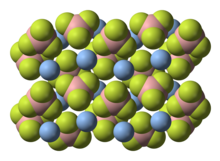| Revision as of 20:31, 31 July 2023 editMarbletan (talk | contribs)Extended confirmed users5,452 editsm (GR) File:Silver tetrafluoroborate.png → File:Silver tetrafluoroborate.svg← Previous edit | Latest revision as of 20:24, 22 April 2024 edit undoArun 01 (talk | contribs)Extended confirmed users1,127 editsm Improved wordingTag: Visual edit | ||
| Line 62: | Line 62: | ||
| ==Laboratory uses== | ==Laboratory uses== | ||
| In the ] and ] laboratory, silver tetrafluoroborate, sometimes referred to "silver BF-4", is a useful ]. In dichloromethane, silver tetrafluoroborate is a moderately strong oxidant.<ref>{{cite journal|author=N. G. Connelly, W. E. Geiger| title=Chemical Redox Agents for Organometallic Chemistry|journal=]|year= 1996| volume= 96|issue=2| pages= 877–910| doi=10.1021/cr940053x| pmid=11848774}}</ref> Similar to ], it is commonly used to replace ] anions or ligands with the ] ] anions. The abstraction of the halide is driven by the precipitation of the |
In the ] and ] laboratory, silver tetrafluoroborate, sometimes referred to "silver BF-4", is a useful ]. In dichloromethane, silver tetrafluoroborate is a moderately strong oxidant.<ref>{{cite journal|author=N. G. Connelly, W. E. Geiger| title=Chemical Redox Agents for Organometallic Chemistry|journal=]|year= 1996| volume= 96|issue=2| pages= 877–910| doi=10.1021/cr940053x| pmid=11848774}}</ref> Similar to ], it is commonly used to replace ] anions or ligands with the ] ] anions. The abstraction of the halide is driven by the precipitation of the corresponding ]. | ||
| ==References== | ==References== | ||
Latest revision as of 20:24, 22 April 2024

| |

| |
| Names | |
|---|---|
| IUPAC name Silver tetrafluoridoborate(1–) | |
| Other names
Borate(1-), tetrafluoro-, silver(1+) Argentous tetrafluoroborate | |
| Identifiers | |
| CAS Number | |
| 3D model (JSmol) | |
| ChemSpider | |
| ECHA InfoCard | 100.034.491 |
| EC Number |
|
| PubChem CID | |
| RTECS number |
|
| CompTox Dashboard (EPA) | |
InChI
| |
SMILES
| |
| Properties | |
| Chemical formula | AgBF4 |
| Molar mass | 194.673 g/mol |
| Appearance | Off-white powder |
| Odor | almost odorless |
| Density | 4.16 g/cm |
| Melting point | 71.5 °C (160.7 °F; 344.6 K) (monohydrate) |
| Solubility in water | soluble |
| Hazards | |
| GHS labelling: | |
| Pictograms | 
|
| Signal word | Danger |
| Hazard statements | H314 |
| Precautionary statements | P260, P264, P280, P301+P330+P331, P303+P361+P353, P304+P340, P305+P351+P338, P310, P321, P363, P405, P501 |
| NFPA 704 (fire diamond) |
 |
| Safety data sheet (SDS) | External MSDS |
| Except where otherwise noted, data are given for materials in their standard state (at 25 °C , 100 kPa).
| |
Silver tetrafluoroborate is an inorganic compound with the chemical formula AgBF4. It is a white solid that dissolves in polar organic solvents as well as water. In its solid state, the Ag centers are bound to fluoride.
Preparation
Silver tetrafluoroborate is prepared by the reaction between boron trifluoride and silver oxide in the presence of benzene.
Laboratory uses
In the inorganic and organometallic chemistry laboratory, silver tetrafluoroborate, sometimes referred to "silver BF-4", is a useful reagent. In dichloromethane, silver tetrafluoroborate is a moderately strong oxidant. Similar to silver hexafluorophosphate, it is commonly used to replace halide anions or ligands with the weakly coordinating tetrafluoroborate anions. The abstraction of the halide is driven by the precipitation of the corresponding silver halide.
References
- "Silver tetrafluoroborate". pubchem.ncbi.nlm.nih.gov. Retrieved 15 December 2021.
- Evgeny Goreshnik, Zoran Mazej, "X-ray single crystal structure and vibrational spectra of AgBF4" Solid State Sciences 2005, Volume 7, pp. 1225–1229. doi:10.1016/j.solidstatesciences.2005.06.007
- N. G. Connelly, W. E. Geiger (1996). "Chemical Redox Agents for Organometallic Chemistry". Chemical Reviews. 96 (2): 877–910. doi:10.1021/cr940053x. PMID 11848774.
| Silver compounds | |||
|---|---|---|---|
| Silver(0,I) | |||
| Silver(I) |
| ||
| Silver(II) | |||
| Silver(III) | |||
| Silver(I,III) | |||
| Salts and covalent derivatives of the tetrafluoroborate ion | ||||||||||||||||||||||||||||||||||||||||||||||||||||||||||||||||||||||||||||||||||||||||||||||||||||||||||||||||||||||||||||||||||||||||||||||||||||||||||||||||||||
|---|---|---|---|---|---|---|---|---|---|---|---|---|---|---|---|---|---|---|---|---|---|---|---|---|---|---|---|---|---|---|---|---|---|---|---|---|---|---|---|---|---|---|---|---|---|---|---|---|---|---|---|---|---|---|---|---|---|---|---|---|---|---|---|---|---|---|---|---|---|---|---|---|---|---|---|---|---|---|---|---|---|---|---|---|---|---|---|---|---|---|---|---|---|---|---|---|---|---|---|---|---|---|---|---|---|---|---|---|---|---|---|---|---|---|---|---|---|---|---|---|---|---|---|---|---|---|---|---|---|---|---|---|---|---|---|---|---|---|---|---|---|---|---|---|---|---|---|---|---|---|---|---|---|---|---|---|---|---|---|---|---|---|---|---|
| ||||||||||||||||||||||||||||||||||||||||||||||||||||||||||||||||||||||||||||||||||||||||||||||||||||||||||||||||||||||||||||||||||||||||||||||||||||||||||||||||||||
This inorganic compound–related article is a stub. You can help Misplaced Pages by expanding it. |